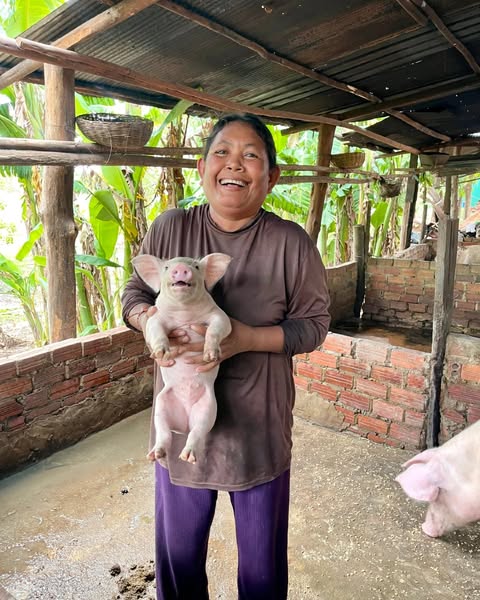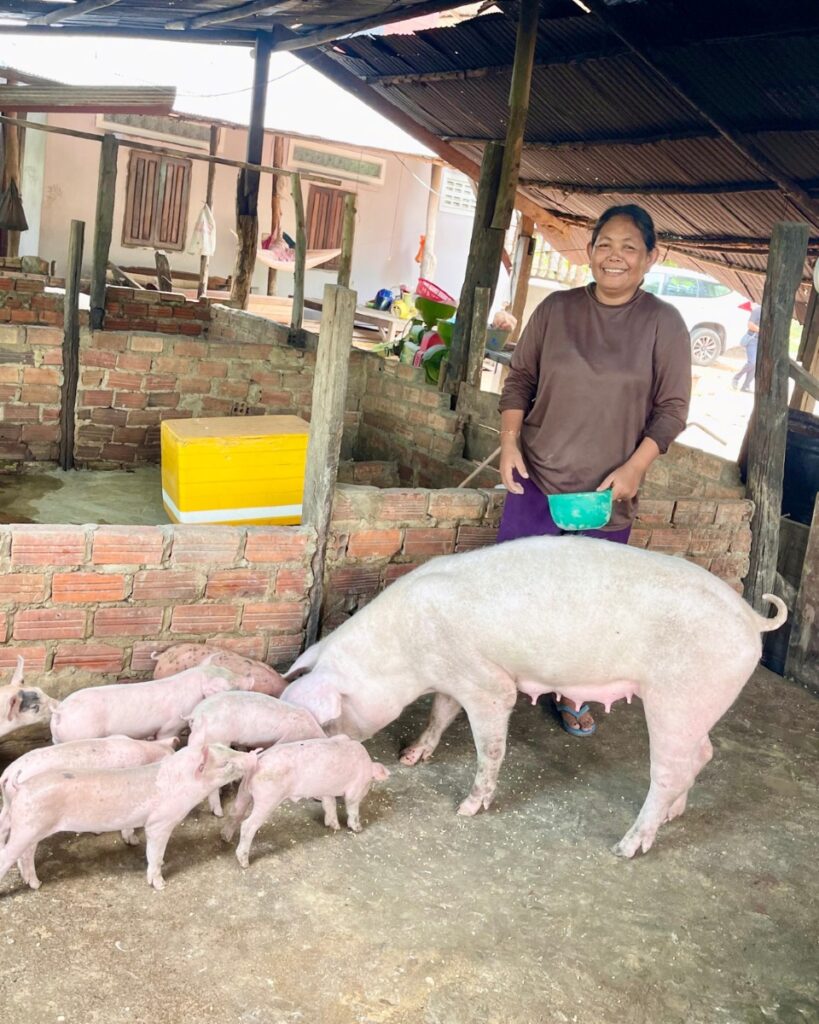the road to independence
In rural Cambodia, many families are poor and lack access to education, healthcare, and jobs. The Shinta Mani Foundation helps by offering micro loans—small, interest-free loans to people who cannot get money from banks. These loans help villagers start or grow small businesses.
For example, some people use the money to buy animals like cows or chickens, which give them food and income. Others open small shops, buy sewing machines, or make crafts. Some use the loan to buy bicycles or motorbikes so they can travel to work or markets more easily.
The programme is different from normal charity because people must pay the loan back, even though they don’t pay interest. This makes people feel proud and responsible. When one person pays back their loan, the money is used to help someone else. This keeps the programme going without needing new money.
The loans improve many parts of life. Families earn more money, send children to school, eat better, and get healthcare. The whole village becomes stronger.
The Shinta Mani Foundation’s micro loan programme gives people the chance to help themselves. It respects their dignity and helps them build a better future—one small loan at a time.
___________________
Vocabulary:
- Rural – a place in the countryside, not in a city or town.
Example: She lives in a small rural village. - To lack access – to not have a way to use or get something.
Example: Many people in rural areas lack access to clean water. - Healthcare – services to keep people healthy, like hospitals, doctors, and medicine.
Example: Good healthcare helps people live longer. - To offer – to give or provide something.
Example: The school offers free English classes. - An interest-free loan – money you borrow and do not have to pay extra for.
Example: He got an interest-free loan to start his business. - A villager – a person who lives in a village.
Example: The villagers grow rice and vegetables. - To grow a business – to make a business bigger or better.
Example: She used the money to grow her small shop. - A chicken – a farm bird that gives eggs and meat.
Example: They keep chickens in their yard. - An income – the money someone earns from work or business.
Example: His income comes from selling fruit. - A sewing machine – a machine used to make or fix clothes.
Example: She makes clothes with her sewing machine. - To make a craft – to create things by hand, like baskets or jewelry.
Example: He makes crafts from wood. - Charity – help given to people in need, often with money or food.
Example: The charity gives clothes to poor families. - To pay back – to return money you borrowed.
Example: I will pay back the loan next month. - To feel proud – to feel happy about something you or someone did well.
Example: She felt proud of her work. - Responsible – someone who does what they need to do and takes care of things.
Example: He is responsible for feeding the animals. - To keep something going – to make something continue.
Example: The teacher worked hard to keep the project going. - To improve – to make something better.
Example: He wants to improve his English. - To earn money – to get money by working.
Example: She earns money by selling vegetables. - To help oneself – to do something without waiting for others to do it.
Example: With the loan, he can help himself and start a business. - To respect dignity – to treat someone in a way that shows they are important and valuable.
Example: We should respect the dignity of all people.
####################
Multiple-choice exercise, one correct answer:
1. What does „respect dignity“ mean?
a) Treat someone as important and valuable
b) Ignore someone’s feelings
c) Make fun of others
2. To „earn money“ means to:
a) Spend money on shopping
b) Get money by working
c) Save money in the bank
3. What is a „chicken“?
a) A farm bird that gives eggs and meat
b) A type of vegetable
c) A small tool for sewing
4. If someone „feels proud,“ they:
a) Feel tired after work
b) Feel happy about something good they did
c) Feel sad about a mistake
5. To „improve“ something means to:
a) Break it
b) Ignore it
c) Make it better
6. Which is the best definition of „charity“?
a) Help given to people in need
b) A loan with interest
c) A type of business
7. „To keep something going“ means to:
a) Forget about it
b) Stop it suddenly
c) Make it continue
8. A „villager“ is:
a) Someone who lives in a city
b) Someone who lives in a village
c) Someone who works in an office
9. If you „lack access“ to something, you:
a) Have many options to use it
b) Do not have a way to use or get it
c) Choose not to use it
10. What does „to help oneself“ mean?
a) To wait for help from others
b) To do something without waiting for others
c) To ask someone else to do it for you
11. An „interest-free loan“ is:
a) Money you borrow and pay extra fees on
b) Money you borrow without paying extra fees
c) Money you receive as a gift
12. What is a „sewing machine“ used for?
a) Cooking meals
b) Cleaning floors
c) Making or fixing clothes
13. To „pay back“ means to:
a) Borrow money again
b) Lose money in a business
c) Return money you borrowed
14. What does „responsible“ mean?
a) Someone who avoids work
b) Someone who ignores their tasks
c) Someone who does their duties and takes care of things
15. To „offer“ something means to:
a) Take it away
b) Give or provide it
c) Hide it
16. What is „healthcare“?
a) Education in schools
b) Services to keep people healthy like doctors and medicine
c) Places where people work
17. If you „grow a business,“ you:
a) Make the business bigger or better
b) Close the business for a while
c) Start a new hobby
18. „Rural“ means:
a) In the countryside, not in the city
b) In a busy city center
c) On the coast by the sea
____________________
1a, 2b, 3a, 4b, 5c, 6a, 7c, 8b, 9b, 10b, 11b, 12c, 13c, 14c, 15b, 16b, 17a, 18a
################

Fill-in-the-gap exercise, with one correct answer.
1. Many people in the ________ areas live far from big cities.
a) rural
b) busy
c) crowded
2. If you ________ access to clean water, you cannot use it easily.
a) have
b) lack
c) gain
3. A small loan without any extra fees is called an ________ loan.
a) interest-free
b) expensive
c) long-term
4. A ________ helps people when they are sick or need medicine.
a) teacher
b) healthcare
c) bank
5. A ________ lives in a small village or countryside.
a) villager
b) traveler
c) teacher
6. When you ________ a business, you make it bigger and better.
a) grow
b) close
c) lose
7. A ________ is a bird often kept on farms for eggs and meat.
a) chicken
b) dog
c) rabbit
8. To ________ money means to get it by working or selling something.
a) earn
b) borrow
c) spend
9. A ________ machine is used to make or fix clothes.
a) sewing
b) cooking
c) cleaning
10. To ________ back a loan means to give the borrowed money back.
a) borrow
b) pay
c) pay
11. When you are ________, you do what you are supposed to do and take care of things.
a) lazy
b) responsible
c) careless
12. To ________ someone means to treat them with respect and value.
a) ignore
b) respect
c) forget
____________________
1a, 2b, 3a, 4b, 5a, 6a, 7a, 8a, 9a, 10c, 11b, 12b
#################
Unscramble these:
- rular
- cacsse
- ealthcareh
- oanl
- llavigre
- ginwse
- cehnick
- rensbsilpoe
- emonci
- ytahcir
_______________________
1 rural, 2 access, 3 healthcare, 4 loan, 5 villager, 6 sewing, 7 chicken, 8 responsible, 9 income, 10 charity
#################

Complete the interview, words below:
Interviewer: What is the Shinta Mani Foundation?
Representative: It is an organization that helps people in __________ Cambodia.
Interviewer: How does your foundation help people?
Representative: We give small loans without __________ to villagers.
Interviewer: What is a micro loan?
Representative: It is a small amount of money that people borrow to start or __________ a business.
Interviewer: Why do you not charge interest on the loans?
Representative: Because many villagers cannot pay extra money. We want to help them __________.
Interviewer: What kinds of __________ do people start with these loans?
Representative: They buy animals like cows and chickens or open small shops.
Interviewer: How do these loans help families?
Representative: Families can earn more __________ and improve their lives.
Interviewer: What does it mean to repay the loan?
Representative: It means to give the money back after some __________.
Interviewer: Why is repaying important?
Representative: It helps the foundation give loans to other __________ too.
Interviewer: How do micro loans affect children?
Representative: When families have more money, children can go to __________.
Interviewer: Does the program help people feel proud?
Representative: Yes, because they work hard and __________their own lives.
Interviewer: What is the goal of your micro loan program?
Representative: To help people __________ independent and strong.
Interviewer: How can people learn more about your work?
Representative: They can visit our __________ or contact us directly.
________________
businesses – improve – money – rural – school – website – interest – villagers – grow – become – time – succeed
##################
Correct version:
Interviewer: What is the Shinta Mani Foundation?
Representative: It is an organization that helps people in rural Cambodia.
Interviewer: How does your foundation help people?
Representative: We give small loans without interest to villagers.
Interviewer: What is a micro loan?
Representative: It is a small amount of money that people borrow to start or grow a business.
Interviewer: Why do you not charge interest on the loans?
Representative: Because many villagers cannot pay extra money. We want to help them succeed.
Interviewer: What kinds of businesses do people start with these loans?
Representative: They buy animals like cows and chickens or open small shops.
Interviewer: How do these loans help families?
Representative: Families can earn more money and improve their lives.
Interviewer: What does it mean to repay the loan?
Representative: It means to give the money back after some time.
Interviewer: Why is repaying important?
Representative: It helps the foundation give loans to other villagers too.
Interviewer: How do micro loans affect children?
Representative: When families have more money, children can go to school.
Interviewer: Does the program help people feel proud?
Representative: Yes, because they work hard and improve their own lives.
Interviewer: What is the goal of your micro loan program?
Representative: To help people become independent and strong.
Interviewer: How can people learn more about your work?
Representative: They can visit our website or contact us directly.